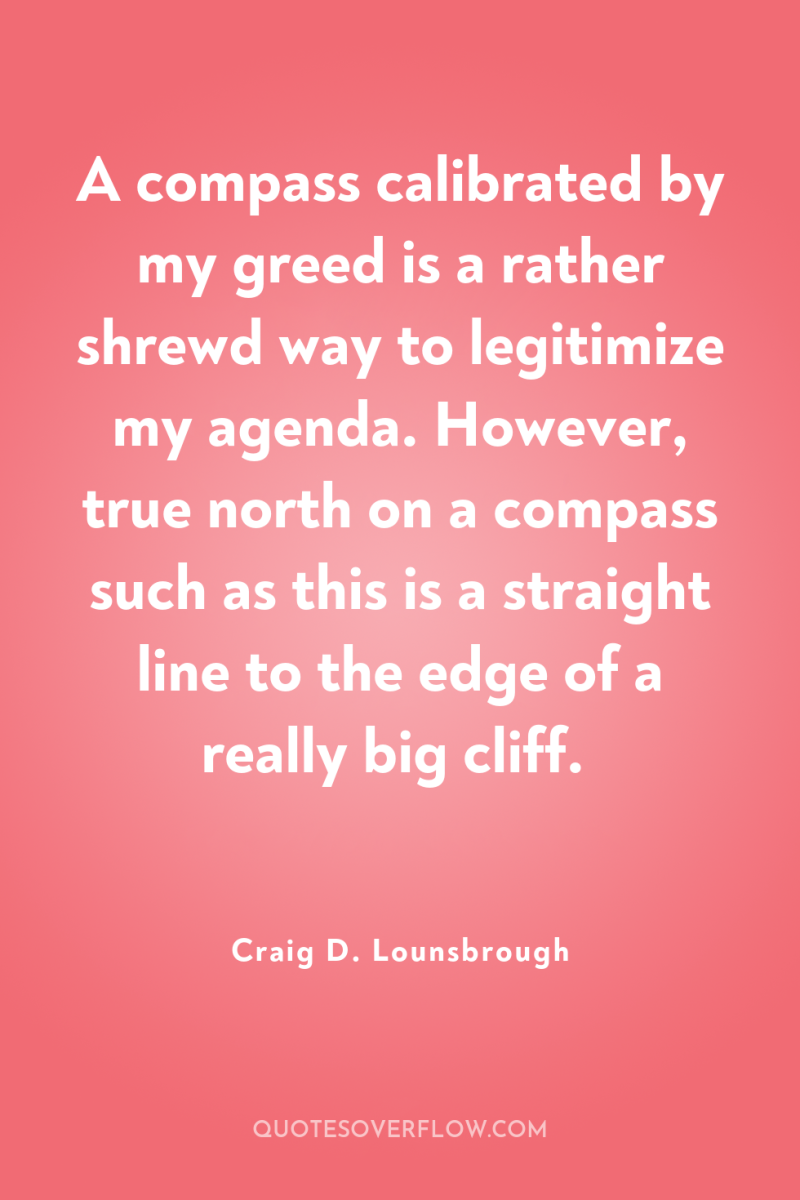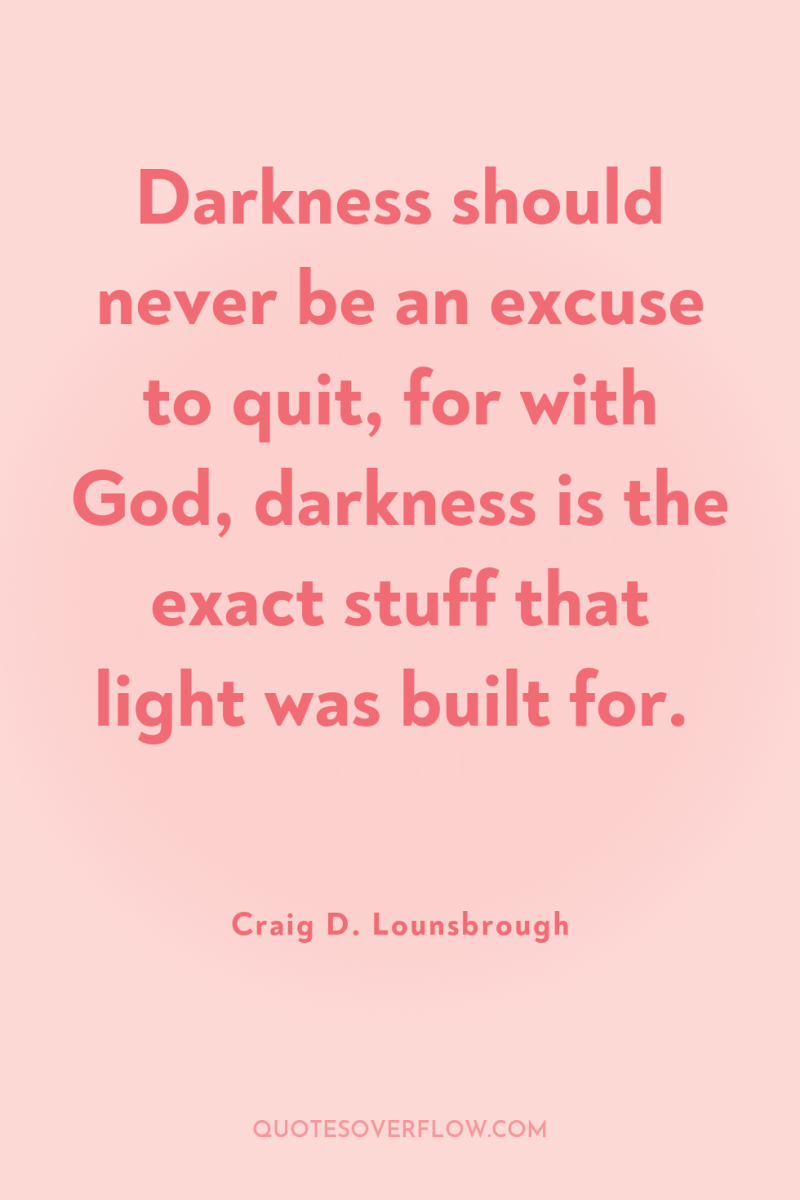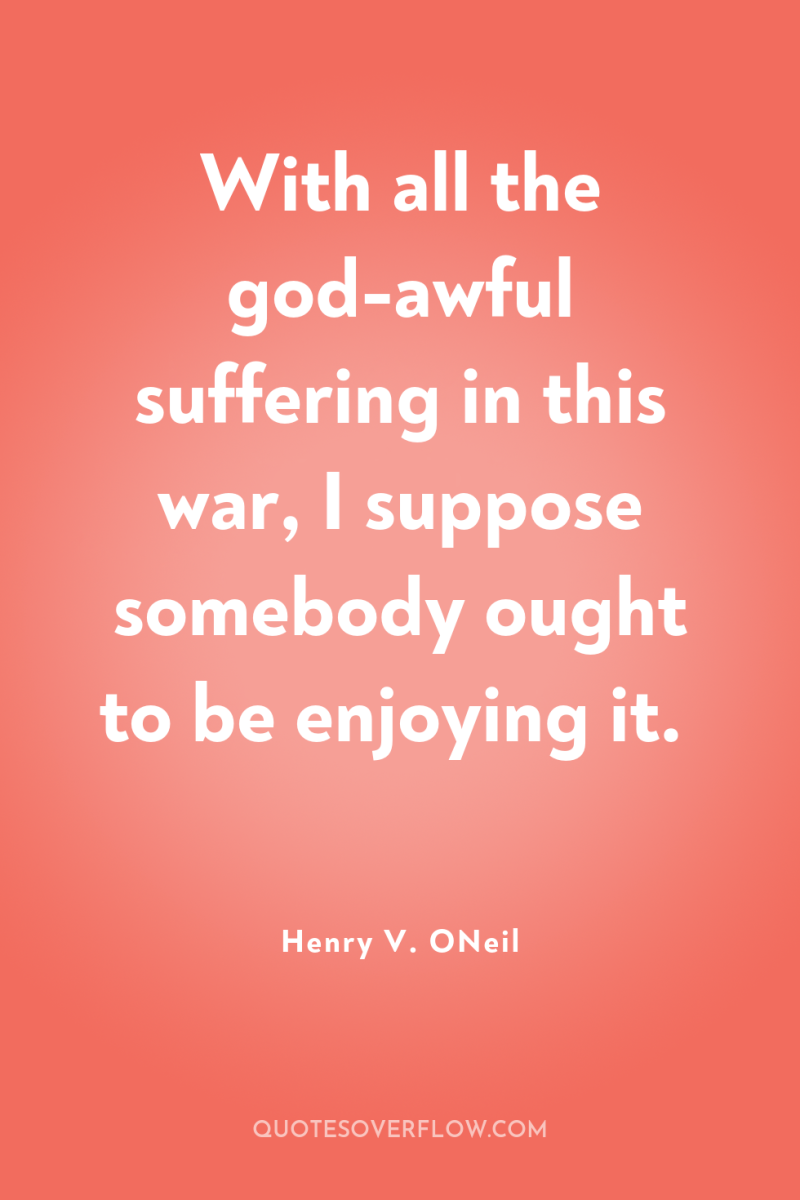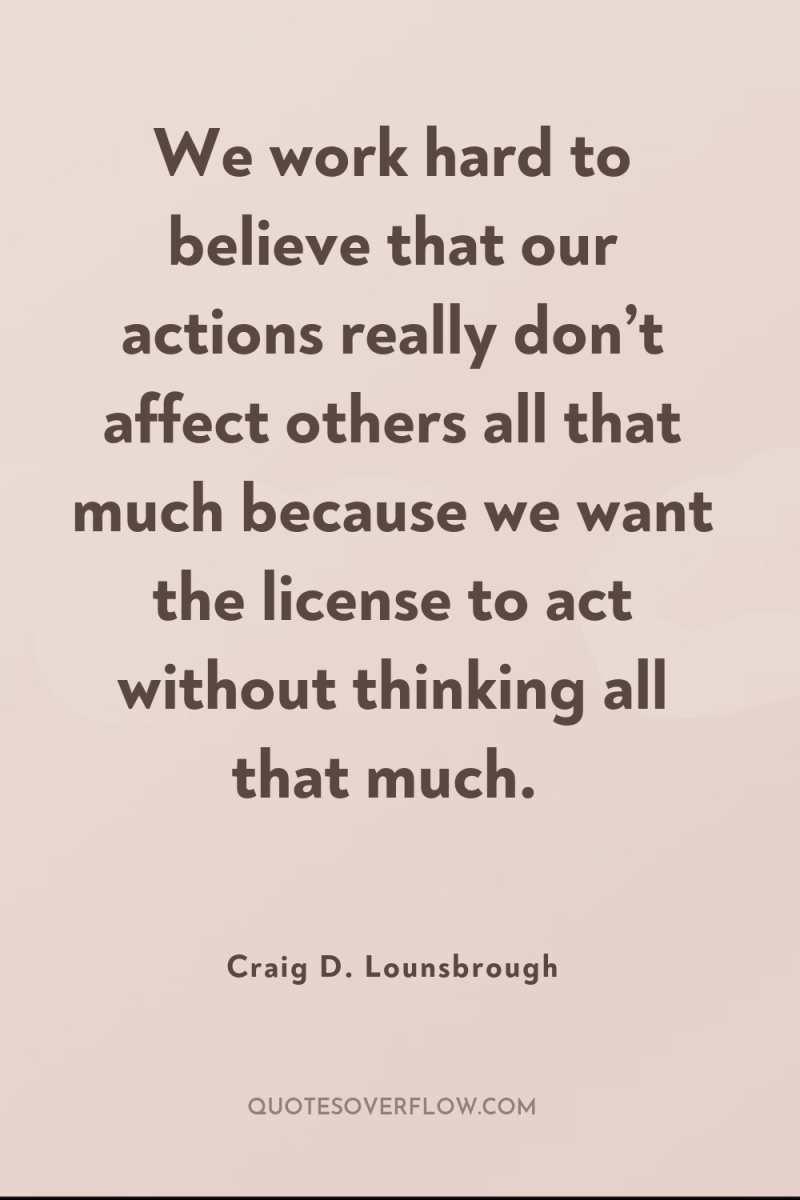1
Ingenuity was apparently given man in order that he may supply himself in crises with shapes and sounds with which to guard himself from truth.William Faulkner

2
A compass calibrated by my greed is a rather shrewd way to legitimize my agenda. However, true north on a compass such as this is a straight line to the edge of a really big cliff.Craig D. Lounsbrough
3
The worst of it is that while we continue to sink deeper into the muck and mire that we’ve created, in the very descent itself we ignorantly declare that in reality we are rising. And until desperation has crippled us sufficiently to confess the lie that we are lifting ourselves out of this mess, and until the panic of utter hopelessness has driven us to completely surrender all of the pathetic contrivances that we’ve fashioned that have put us there, we will never realize that God has readied solid ground that stands but a single step away .Craig D. Lounsbrough

4
Darkness should never be an excuse to quit, for with God, darkness is the exact stuff that light was built for.Craig D. Lounsbrough

5
With all the god-awful suffering in this war, I suppose somebody ought to be enjoying it.Henry V. ONeil

6
We work hard to believe that our actions really don’t affect others all that much because we want the license to act without thinking all that much.Craig D. Lounsbrough
7
If you are stuck in circumstances in which it takes Herculean efforts to get through the day– doing low-income work, obeying an authoritarian boss, buying clothes for the children, dealing with school issues, paying the rent or mortgage, fixing the car, negotiating with a spouse, paying taxes, and caring for older parents– it is not easy to pay close attention to larger political issues. Indeed you may wish that these issues would take care of themselves. It is not a huge jump from such a wish to become attracted to a public philosophy, spouted regularly at your job and on the media, that economic life would regulate itself automatically if only the state did not repeatedly intervene in it in clumsy ways. Now underfunded practices such as the license bureau, state welfare, public health insurance, public schools, public retirement plans, and the like begin to appear as awkward, bureaucratic organizations that could be replaced or eliminated if only the rational market were allowed to take care of things impersonally and quietly, as it were. Certainly such bureaucracies are indeed often clumsy. But more people are now attracted to compare that clumsiness to the myth of how an impersonal market would perform if it took on even more assignments and if state regulation of it were reduced even further. So a lot of “independents” and “moderates” may become predisposed to the myth of the rational market in part because the pressures of daily life encourage them to seek comfort in ideological formations that promise automatic rationality. .William E. Connolly
8
There is no law against delaying action to weigh it in thought.Unarine Ramaru
9
One of the saddest lessons of history is this: If we’ve been bamboozled long enough, we tend to reject any evidence of the bamboozle. We’re no longer interested in finding out the truth. The bamboozle has captured us. It’s simply too painful to acknowledge, even to ourselves, that we’ve been taken. Once you give a charlatan power over you, you almost never get it back.Carl Sagan
10
I treat my thoughts like an old person treats their valuables: I cannot for the life of me proceed to throwing them out.Criss Jami
11
Our emotions hold more power over us than blade or poison alike. To embrace freely the entire spectrum of our emotions is to allow a multitude of Trojan horses containing hidden emotional poisons to circumvent the walls of rationalization — walls we need to protect our trust, confidence, understanding, and self-control.A.J. Darkholme
12
Mediocrity is ‘purpose’ left to rot in minds ensnared in the deluded rationalization that vision is nothing more than a collection of fanciful dreams constructed by an imaginary God.Craig D. Lounsbrough
13
At cocktail parties, I played the part of a successful businessman's wife to perfection. I smiled, I made polite chit-chat, and I dressed the part. Denial and rationalization were two of my most effective tools in working my way through our social obligations. I believed that playing the roles of wife and mother were the least I could do to help support Tom's career. During the day, I was a puzzle with innumerable pieces. One piece made my family a nourishing breakfast. Another piece ferried the kids to school and to soccer practice. A third piece managed to trip to the grocery store. There was also a piece that wanted to sleep for eighteen hours a day and the piece that woke up shaking from yet another nightmare. And there was the piece that attended business functions and actually fooled people into thinking I might have something constructive to offer. I was a circus performer traversing the tightwire, and I could fall off into a vortex devoid of reality at any moment. There was, and had been for a very long time, an intense sense of despair. A self-deprecating voice inside told me I had no chance of getting better. I lived in an emotional black hole.p20-21, talking about dissociative identity disorder (formerly multiple personality disorder).Suzie Burke
14
The ego is a mean mechanism which mobilizes the absolute strongest rationalization traps in order to preserve itself.John Duover
15
Habitual excuses for inactivity indicates little or no interest in what one ought to have done.Itohan Eghide
16
As long as he retains externally the habits of a Christian he can still be made to think of himself as one who has adopted a few new friends and amusements but whose spiritual state is much the same as it was six weeks ago. And while he thinks that, [he will not repent] of a definite, fully recognized, sin,. . only [vaguely and uneasily] feeling that he hasn't been doing very well lately.. If such a feeling is allowed to live.. it increases reluctance to think about [God]. All humans at nearly all times have some such reluctance; but when thinking of Him involves facing and intensifying a whole vague cloud of half-conscious guilt, this reluctance is increased tenfold. They hate every idea that suggests Him, just as men in financial embarrassment hate the very sight of a bankbook. In this state.. {man] will increasingly dislike his religious duties. He will think about them as little as he feels he decently can beforehand, and forget them as soon as possible when they are over. He will want his prayers to be unreal, for he will dread nothing so much as effective contact with [his Heavenly Father].. Uneasiness and his reluctance to face it cut him off more and more from all real happiness..C.s. Lewis
17
We can hide a lot of stuff until God shows up, for when God shows up nothing is hidden, which includes both our embarrassment and His forgiveness.Craig D. Lounsbrough
18
If someone were to propose that the planets go around the sun because all planet matter has a kind of tendency for movement, a kind of motility, let us call it an ‘oomph, ’ this theory could explain a number of other phenomena as well. So this is a good theory, is it not? No. It is nowhere near as good as the proposition that the planets move around the sun under the influence of a central force which varies exactly inversely as the square of the distance from the center. The second theory is better because it is so specific; it is so obviously unlikely to be the result of chance. It is so definite that the barest error in the movement can show that it is wrong; but the planets could wobble all over the place, and, according to the first theory, you could say, ‘Well, that is the funny behavior of the ‘oomph.Richard Feynman
19
Of what use was memory anyway than as a template for one's most reassuring self-deceptions!Ashim Shanker
20
Tolstoy said, 'The antagonism between life and conscience may be removed either by a change of life or by a change of conscience.' Many of us have elected to adjust our consciences rather than our lives. Our powers of rationalization are unlimited. They allow us to live in luxury and indifference while others, whom we could help if we chose to, starve and go to hell.Randy Alcorn
21
The reason placing blame repeatedly fails to work is that I repeatedly place it on everyone else instead of where it actually belongs.Craig D. Lounsbrough
22
When I was a young philosopher, I asked a senior colleague, Pat Suppes (then and now a famous philosopher of science and an astute student of human nature), what the secret of happiness was. Instead of giving me advice, he made a rather droll observation about what a lot of people who were happy with themselves seem to have done, namely:1. Take a careful inventory of their shortcomings and flaws2. Adopt a code of values that treats these things as virtues3. Admire themselves for living up to it Brutal people admire themselves for being manly; compulsive pedants admire themselves for their attention to detail; naturally selfish and mean people admire themselves for their dedication to helping the market reward talent and punish failure, and so on.John R. Perry
23
Carla's description was typical of survivors of chronic childhood abuse. Almost always, they deny or minimize the abusive memories. They have to: it's too painful to believe that their parents would do such a thing. So they fragment the memories into hundreds of shards, leaving only acceptable traces in their conscious minds. Rationalizations like "my childhood was rough, " "he only did it to me once or twice, " and "it wasn't so bad" are common, masking the fact that the abuse was devastating and chronic. But while the knowledge, body sensations, and feelings are shattered, they are not forgotten. They intrude in unexpected ways: through panic attacks and insomnia, through dreams and artwork, through seemingly inexplicable compulsions, and through the shadowy dread of the abusive parent. They live just outside of consciousness like noisy neighbors who bang on the pipes and occasionally show up at the door.David L. Calof
24
When we look at Abraham, Sarah, Hagar and Ishmael, we see that God's grace can survive our three-ring-circuses of compromise, rationalization and weak faith.Unknown
25
There's never been an act done since the beginning, from a kid stealing candy to a dictator committing genocide, that the person doing it didn't think he was fully justified. That's a mental trick called rationalizing, and it's done the human race more harm than anything else you can name.Leigh Brackett
26
Sometimes evil didn't need an excuse. Sometimes evil just was.Nenia Campbell
27
With no one to confide in, she'd held the argument inside her own head and naturally found a way to dissolve facts into concepts and concepts into explanations that in the end explained nothing at all.Vincent H. ONeil
28
Has it not ‘dawned’ on us that many of the things that we incessantly blame others for are actually things that our actions originally set in motion? Or, are we too weak to experience a ‘dawning’ of that sort?Craig D. Lounsbrough
29
These prinÂciples laid down as in variable rules: that one must pay a card sharper, but need not pay a tailor; that one must never tell a lie to a man, but one may to a woman; that one must never cheat any one, but one may a husband; that one must never pardon an insult, but one may give one and so on. These principles were possibly not reasonable and not good, but they were of unfailing certainty, and so long as he adhered to them, Vronsky felt that his heart was at peace and he could hold his head up.Leo Tolstoy
30
The truth is, most people who do what you'd call 'wrong' do it for what they call 'right' reasons.Brandon Sanderson
31
Yet our common moral knowledge is as real as arithmetic, and probably just as plain. Paradoxically, maddeningly, we appeal to it even to justify wrongdoing; rationalization is the homage paid by sin to guilty knowledge.J. Budziszewski
32
I think the world honestly would be a much healthier place if instead of trying to find rationalizations for our bad behavior we would just say, "I was an asshole. Sure, there were reasons behind it, but that doesn't matter.Colin Quinn
33
To recklessly excuse a failure is to believe that I’ve effectively erased it from the story of my life, when I’ve actually imprinted it in indelible ink.Craig D. Lounsbrough
34
Rationalization is foreplay with one's conscience.Unknown
35
If now we attend to ourselves on occasion of any transgression of duty, we shall find that we in fact do not will that our maxim should be universal law, for that is impossible for us; on the contrary, we will that the opposite should remain a universal law, only we assume the liberty of making an exception in our own favor or (just for this time only) in favor of our inclination. Consequently, if we considered all cases from one and the same point of view, namely, that of reason, we should find a contradiction in our own will, namely, that a certain principle should be objectively necessary as a universal law, and yet subjectively should not be universal, but admit of exceptions. As, however, we at one moment regard our action from the point of view of a will wholly conformed to reason, and then again look at the same action from the point of view of a will affected by inclination, there is not really any contradiction, but an antagonism of inclination to the precept of reason, whereby the universality of the principle is changed into mere generality, so that the practical principle of reason shall meet the maxim half way. Now, although this cannot be justified in our own impartial judgement, yet it proves that we do really recognize the validity of the categorical imperative and (with all respect for it) only allow ourselves a few exceptions which we think unimportant and forced from us. .Immanuel Kant
36
The chaplain had sinned, and it was good. Common sense told him that telling lies and defecting from duty were sins. On the other hand, everyone knew that sin was evil and that no good could come from evil. But he did feel good; he felt positively marvelous. Consequently, it followed logically that telling lies and defecting from duty could not be sins. The chaplain had mastered, in a moment of divine intuition, the handy technique of protective rationalization, and he was exhilarated by his discovery. It was miraculous. .Joseph Heller
37
Lifting your eyes from the things of this world is an activity that must begin WHERE YOU ARE.K.P. Yohannan
38
Your theology won't always work toward your obedience, because your use of theology is dictated by the condition of your heart. If your heart is not submitting to the plan of God, you will actually use your theology to justify things that should not be justified.Paul David Tripp
39
How many times has our conscience firmly prompted us to ‘draw the line, ’ and we showed up with an eraser?Craig D. Lounsbrough
40
We first crush people to the earth, and then claim the right of trampling on them forever, because they are prostrate.Unknown
41
To incessantly blame others for my shortcomings is cowardice borne of fear, fed by fear, and haunted by fear. To be steadfastly accountable for my shortcomings is bravery borne of God, fed by God, and blessed by God.Craig D. Lounsbrough
42
An educated theologian: someone who's better at rationalizing what they're pretending to know.Peter Boghossian
43
I paved the path to the very place I don’t want to be. But passing the blame off to someone else doesn’t put me any place else.Craig D. Lounsbrough
44
Thomas was like a drug, so smooth and overwhelming that he took one up a level in their emotions just by watching him and listening to him. He was a natural entertainer, filled with talent and knowledge on many subjects and a keen sense of the arts and music. I admired him as he performed for us, and I forgot the ugliness againSara Niles
45
We have become used to obstructionist ideas. In the name of modernisation we are unconsciously hindering the natural flow of life. The fact that we are irritated, depressed, and distressed speaks volumes of our illogical ambitions to acquire control of this planet. Mostly, philosophically challenged and scant respect for natural way of life is making us irrelevant.Amitav Chowdhury
46
Everybody makes excuses for themselves they wouldn't be prepared to make for other people.Rebecca Goldstein
47
He had a clear conscience. Never used it.Unknown
48
Many common lies and hypocrisies are like that, just out of the harmony of the moment.Saul Bellow
49
To be alone with myself in the space of silence is horrifying, for I know with the utmost certainty that in that space I will hear the very things that I constantly use the clamor to drown out. And so the question becomes, how long can I keep up all the noise?Craig D. Lounsbrough
50
Avoidance is paying forward that which I would be much wiser to pay off.Craig D. Lounsbrough